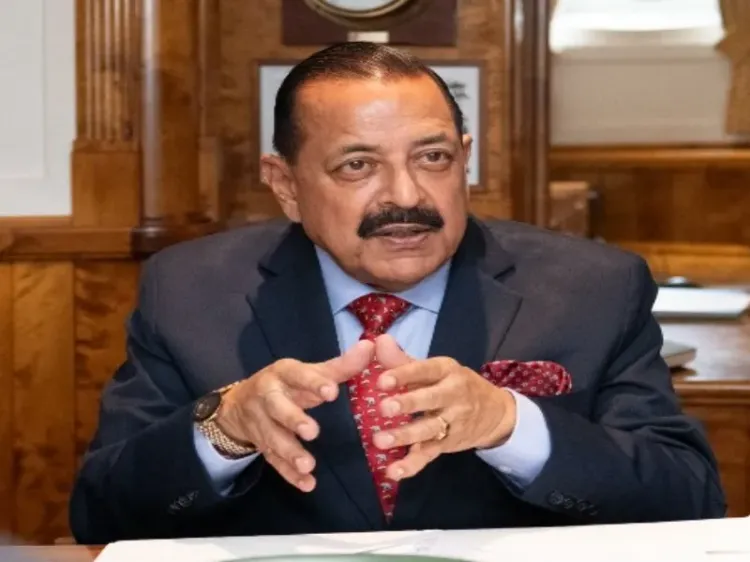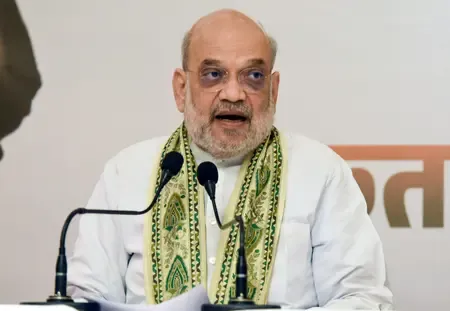Does India Support an Ocean Pact and Plastic Ban at the UN Summit in Nice?

Synopsis
Key Takeaways
- India calls for urgent global action on ocean health.
- Union Minister Jitendra Singh emphasizes the need for a global ocean pact.
- Significant advancements in deep-sea exploration with 'Samudrayaan' project.
- India's successful initiatives in cleaning coastlines and addressing marine plastic pollution.
- Commitment to ratifying the BBNJ Agreement and creating a Global Plastics Treaty.
Nice (France), June 10 (NationPress) India has urgently advocated for global action on ocean health, with Union Minister of Earth Sciences Jitendra Singh emphasizing the need for a comprehensive global ocean pact. He highlighted significant advancements in deep-sea exploration, marine plastic clean-up, and sustainable fisheries.
While representing India at the third United Nations Ocean Conference (UNOC3) in Nice, Singh discussed the upcoming manned submersible of the deep ocean mission, a nationwide ban on single-use plastics, and over $80 billion earmarked for Blue Economy initiatives.
Singh affirmed India's support for the prompt ratification of the BBNJ Agreement, advocated for a legally binding Global Plastics Treaty, and introduced the SAHAV digital ocean data portal, reinforcing India's leadership in global marine governance.
At the conference, co-hosted by France and Costa Rica under the theme “Accelerating Action and Mobilizing All Actors to Conserve and Sustainably Use the Ocean,” Singh reiterated India's commitment to Sustainable Development Goal 14: Life Below Water.
He detailed India's strategies aimed at reversing ocean degradation through science, innovation, and inclusive partnerships.
A standout feature was the progress on the Deep Ocean Mission’s ‘Samudrayaan’ project, which plans to deploy India's first manned submersible by 2026 to explore depths of up to 6,000 meters, marking a significant leap in India's scientific capabilities.
Singh also emphasized expanding India's Marine Protected Areas, currently covering 6.6 percent of the Exclusive Economic Zone, contributing positively to global biodiversity targets.
On the issue of marine pollution, he highlighted the successful outcomes of the ‘Swachh Sagar, Surakshit Sagar’ campaign, which has cleaned over 1,000 km of coastline and removed more than 50,000 tonnes of plastic waste since 2022.
“A draft marine litter policy is underway, and India remains committed to supporting negotiations for a Global Plastics Treaty aimed at establishing a legally binding international framework,” he noted.
India’s Blue Economy initiatives, spearheaded by the Sagarmala Programme and the Pradhan Mantri Matsya Sampada Yojana (PMMSY), were also showcased, with over 600 port-led infrastructure projects worth $80 billion operationalized and $2.5 billion invested in modernizing the fisheries sector.
“The government reported a 10 percent increase in fish production and the establishment of over 1,000 fish farmer producer organizations since the last UN Ocean Conference in 2022,” Singh stated.
Highlighting climate resilience, Singh mentioned the restoration of over 10,000 hectares of mangroves and the execution of shoreline management plans utilizing nature-based solutions.
India has integrated ocean-based climate actions into its Nationally Determined Contributions (NDCs) under the Paris Agreement. India's growing role in global ocean governance is evident through its co-leadership in ‘Blue Talks’ with France and Costa Rica, and its active participation in high-level events, including the India-Norway side session on Marine Spatial Planning.
The launch of the ‘SAHAV’ portal during the conference further cements India's credentials in promoting transparent, science-based ocean management.
Jitendra Singh called for a robust ‘Nice Ocean Action Plan’, urging the global community to invest in innovation, ratify the BBNJ Agreement, and finalize the plastics treaty.
“The ocean is our shared heritage and responsibility,” he remarked, expressing India’s eagerness to collaborate with all stakeholders—governments, the private sector, civil society, and indigenous communities—to secure a sustainable ocean future.
The Indian delegation's presence at UNOC3 sends a clear message: India is positioning itself not only as a coastal nation but as an active participant in shaping global ocean policy.
As the host of the third UN Ocean Conference (UNOC3), France is the global capital of ocean governance this week, welcoming thousands of delegates.
Co-hosted by the governments of Costa Rica and France, the summit appointed Costa Rica's President Rodrigo Chaves Robles and French President Emmanuel Macron as co-presidents.
During his opening remarks, President Macron stressed the importance of revitalizing multilateralism, declaring that “the ocean is not for sale” and emphasizing the necessity for an ambitious action plan for a healthy, sustainable, and productive ocean.
“What has been lost in a generation can return in a generation,” stated UN Secretary-General António Guterres, urging a shift from plunder to protection, exclusion to equity, and short-term exploitation to long-term stewardship of the ocean. In the opening plenary, speakers underscored the urgency of ratifying the Agreement under the UN Convention on the Law of the Sea (UNCLOS) concerning the Conservation and Sustainable Use of Marine Biological Diversity in Areas beyond National Jurisdiction (BBNJ Agreement).
Countries including Dominica, Greece, Norway, and Romania announced their recent ratifications, raising the total to 33, while others reiterated their commitments. The importance of a moratorium or precautionary pause on deep-sea mining was also emphasized to ensure the effective protection of deep-sea ecosystems, with Cyprus, Latvia, Luxembourg, and Slovenia joining in this call, making a total of 36 countries opposing deep-sea mining. Additionally, the fight against plastic pollution was highlighted, urging the timely finalization of the UN plastics treaty.
(Vishal Gulati can be reached at vishal.g@ians.in)









